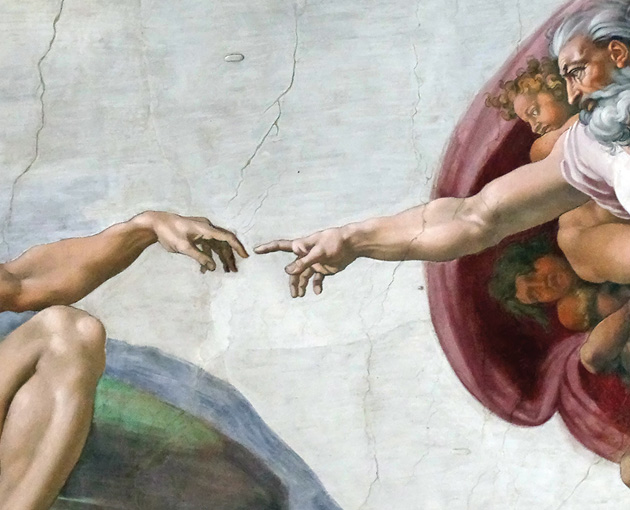So God created humankind in his image . . .
God created humanity with minds to contemplate the greatest existential questions. God also provided His Word, which gives us abundant guidance to answer those questions and live out the implications found in those answers. Perhaps the most prominent question for each of us is “Who am I?” because the reply must satisfy a lifetime of soul-searching and give us our purpose in living. The answer? I am a unique and beloved child of God, created in His very image. The theological term for this is imago Dei.
When God created human beings as the final apex of His creation, He said: “‘Let us make humankind in our image, according to our likeness…’ So God created humankind in his image, in the image of God he created them; male and female he created them” (Genesis 1:26-27, NRSV).
But what does it mean that we are created in the image of God? Does that mean God is identical to us in form as if we were Xerox copies of the Divine presence? If God looked in a mirror, would He look just like us? Well, not exactly, or at least, not literally. The Bible uses figurative speech at times to describe the actions and qualities of God, language drawn from our familiarity with the human body. For example, the Scriptures speak of God’s “eyes” (Amos 9:3, Psalm 34:15), God’s “ears” (Daniel 9:18), God’s “hands” (Isaiah 5:25, Exodus 7:5), God’s “feet” (Genesis 3:8, Isaiah 63:3), God’s “arm” (Exodus 6:6), God’s “face” (Leviticus 20:6, Numbers 6:25), and God’s “fingers” (Exodus 31:18). This manner of speech is called anthropomorphism—using figurative terms of the human body to describe an action or attribute of God. How else can we speak of the unfathomable, indescribable, transcendent God? We must use the language of poetry and parable, with terms and images familiar to us, to point to that which is entirely unfamiliar and beyond our comprehension. Our minds are simply too small to capture or surround God with empirical precision. Scriptures tell us plainly that God is spirit (John 4:24), that His thoughts are not our thoughts, and His ways are not our ways (Isaiah 55:8).
So if the “image of God” does not necessarily refer to God having a form like ours, what does it mean that we are created imago Dei? What we hold in common with God is not form but the potential of reflecting His character. Even though that reflection will never be pure or complete, we mirror His divinity through our moral, spiritual, and intellectual nature. For example, God created humankind with the unique capacity to be self-aware, choose right from wrong, think abstractly, and make the voluntary decision to live in a covenant relationship with Him both now and for eternity. No other creature or thing God created shares these attributes with humankind. So, when we love sacrificially, when we look out for the interests of the marginalized and vulnerable, when we forgive others who have wronged us, and when we stop to be overwhelmed by joy and gratitude for God’s magnificent generosity, we reflect the character of God, the very image of God.
“God so loved the world, that He gave” (John 3:16)… These words offer one aspect of God’s character: abundant love and generosity. Perhaps we are never more like God than when we give—sharing the wealth and gifts He has entrusted to us, giving love to the one who is hard to love, or sacrificing our self-interest for the sake of someone else.
Jesus often spoke about money and possessions. He knew that money makes a terrible master but a wonderful servant. It all boils down to how we relate to the abundance God entrusts to us. When we allow the generosity of God that comes to us, to also pass through us to others, we give the world a window into God’s character. We are generous because we are created by, and we serve, a benevolent God. He is manifest through us. Imago Dei, indeed!
by Pastor Allen Walworth






